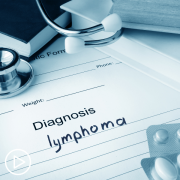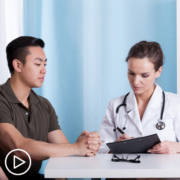The Benefits of Having a Role in Your DLBCL Treatment Decisions
The Benefits of Having a Role in Your DLBCL Treatment Decisions from Patient Empowerment Network on Vimeo.
Diffuse large B-cell lymphoma (DLBCL) patients have a vital role in their treatment decisions. Expert Dr. Loretta Nastoupil shares advice for patients on how to advocate for their best care, the value of a second opinion, and credible resources to boost knowledge about DLBCL.
Diffuse large B-cell lymphoma (DLBCL) patients have a vital role in their treatment decisions. Expert Dr. Loretta Nastoupil shares advice for patients on how to advocate for their best care, the value of a second opinion, and credible resources to boost knowledge about DLBCL.
See More From The Pro-Active DLBCL Patient Toolkit
Related Programs:

|

|

|
Transcript:
Katherine:
But what do you feel is the patient’s role in this whole decision?
Dr. Nastoupil:
So, I’ve actually been a patient myself, and I have mixed feelings about it. I think oftentimes as an oncologist, we share decision-making when we don’t know the exact path forward, meaning if there’s something controversial or you have more than one option, generally, we kind of put out all the information to the patient, and we want you to be part of that decision-making.
And I think that’s important because we’re all humans, and we all want liberties. And we want our patient rights to be acknowledged and respected. And that’s important. I think sometimes though that also burdens patients with making decisions when they may feel they don’t have all of the information to make an informed decision.
But your role as the patient is you know your body better than anyone. And, generally, if there’s something that just doesn’t fit well or sit well with you, be vocal about it. So, I’ve been in a situation where I felt like I had to speak up a few times, and not that I have all the answers. And I am an oncologist. So, I generally have more insight than others.
But, generally, I was right in that, again, I think we know our own bodies. And when you feel that something is being missed or maybe not given the time and attention it deserves, speak up. You also have a role in making sure that the diagnosis is correct.
So, I generally advise all patients because everything hinges on the diagnosis in lymphoma, more so than the staging, more so than sometimes even the treatment itself.
Getting a second opinion can be incredibly valuable because you have another pathologist that will lay eyes on this biopsy. And lymphoma is rare. So, a second opinion can be incredibly valuable, and that’s usually something driven by a patient more so than an oncologist. Though some oncologists – and I would say the majority – are open to an opinion because they too would like information or confirmation that they’re on the right path.
Katherine:
Certainly.
Dr. Nastoupil:
The other thing that I think patients can have role is exploring what trial options are out there and available to them. I think that is sometimes a tough subject to discuss. Clinical trials are not only for patients who have failed all the standard treatments.
And it’s usually not an option of hospice versus a clinical trial. That’s absolutely an inappropriate time to consider a clinical trial. And, generally, there are trials at any point in a patient’s journey where there is some controversy as to the best path forward.
Again, I’ve been discussing the last 40 years of trying to improve upon R-CHOP is because 60 percent of patients were cured, but 40 percent were not. There is always a scenario where we could do better. And, generally, the only way we will improve upon outcomes is to conduct important rational clinical trials.
So, sometimes, it’s as simple as reaching out, participating in programs such as this, reaching out to The Lymphoma & Leukemia Society or the Lymphoma Research Foundation to just explore what are your trial options. They may not be appropriate for you right now, but at least understanding where there is an opportunity to participate in a trial is worth exploring.
Katherine:
Dr. Nastoupil, I’m wondering how patients can feel confident in speaking up and becoming a partner in their care?
Dr. Nastoupil:
So, it’s important to recognize, and I reflect on this all the time. Generally, once patients have been rendered a diagnosis of cancer, that’s a life-altering event. And even if I spend a lot of time trying to reassure patients that outcomes for lymphoma patients are very good, generally we’re aiming for cure, that’s not true for everyone.
And you can’t help but be concerned that you will succumb to this disease or that the toxicity of therapy is going to be life-altering and impact your quality of life in such a way that it’s no longer the life that you were happy to live.
And so, I recognize that we are partners in this. My job is to choose the most effective therapy that will try and accomplish the goals we set out to achieve. However, sometimes, oncologists make assumptions about what the goal of a given patient is.
We’re assuming that longevity or living is the most important goal. Whereas sometimes, people might care more about the quality of life, or they may need more reassurances about what the options are or their realistic outcomes with therapy. Because, again, I’ve mentioned before, oncologists are generally eternal optimists. We tend to sugarcoat things a little bit.
So, it’s important for patients to recognize that they will have a shared decision responsibility, meaning oftentimes we will provide all the information that we have access to in terms of a given treatment.
What is the likelihood of success, what is the potential risk in terms of toxicity, and what we’re leaning towards one therapy over another, particularly if you have more than one option.
But, ultimately, we need patients to share with us what their goals are in terms of outcome of that treatment so that we can then potentially refine our treatment selection. So, again, being informed, participating in programs like this so that you understand what makes one lymphoma different from another. Why would one oncologist offer one treatment and another discuss something else?
So, understanding what the different lymphomas are, how they might be approached differently, what the new therapies are. I struggle to keep up with just the lymphoma literature and changes. I can’t imagine what it must be like for an oncologist that treats every cancer type. So, again, understanding that new drugs are approved almost every couple of months in lymphoma may provide an opportunity for patients to share new information with their oncologists as well.










